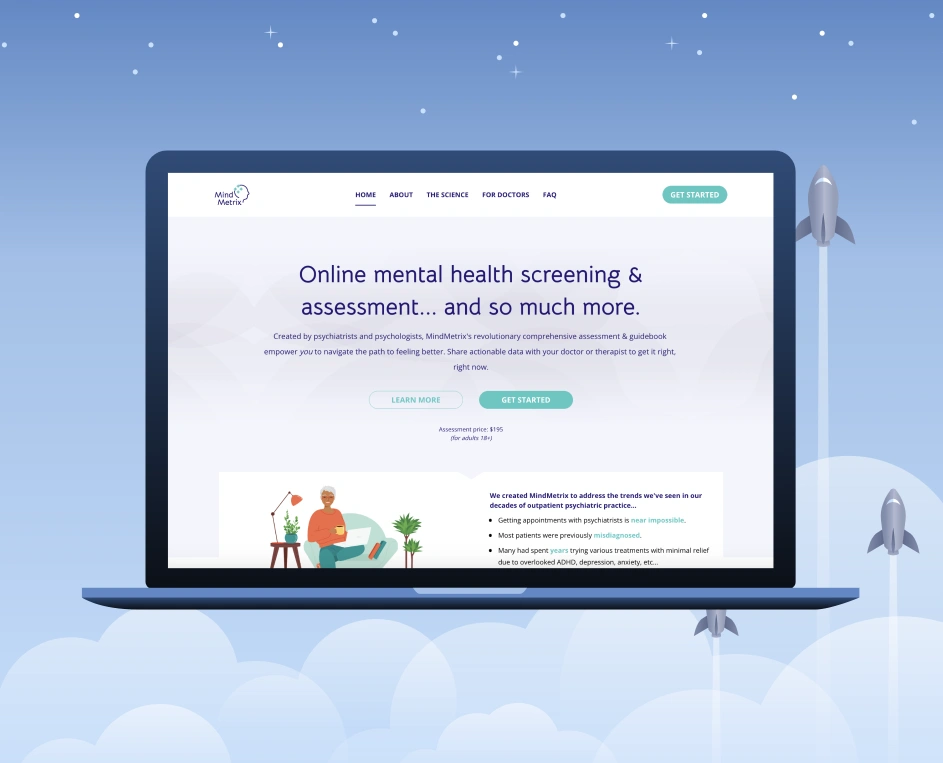MindMetrix Makes Mental Health Assessment Easy, Personal, and Confidential

In partnership with The Rochester Center for Behavioral Medicine, we are excited to announce the launch of MindMetrix. MindMetrix is a comprehensive mental health screening and assessment tool that can support mental health consumers in identifying possible explanations for their symptoms and guiding them to find the right treatment.
The Challenge of Mental Health Misdiagnosis
Primary care providers are on the front lines of the fight against mental illness. Patients trust their primary doctors, and these doctors are often the people they turn to first when experiencing mental health symptoms. As a result, primary care providers write more than 60% of all psychiatric medication prescriptions.
Primary care providers know and care about their patients. They often have spent years together, talking about their families and lives. And so they want to help and often feel pressure to act quickly due to long waitlists in psychiatric settings. But they’re not experts on mental illness. Many feel uncertain about their diagnosis. This helps explain why mental health misdiagnosis is so common in primary care settings.
In one study, researchers looked at 840 primary care mental health diagnoses, and found shockingly high rates of misdiagnosis—65.9% for major depression, 92.7% for bipolar, 85.8% for panic disorder, 71% for generalized anxiety disorder, and 97.8% for social anxiety disorder.
It should come as no surprise that patients often report that their psychiatric medications don’t work. They may be taking the wrong medication, at the wrong dose, for the wrong diagnosis, or they may be relying too heavily on medication for a condition that is best treated with therapy.
These misdiagnoses can be catastrophic. Ritalin, for example, can be great for ADHD but terrible for generalized anxiety disorder. An antipsychotic won’t stop panic attacks. And medications for insomnia and panic can be addictive, making them particularly harmful to people with a history of substance use disorders. The wrong medication makes symptoms worse. It can interact harmfully with other drugs, increasing the risk of overdose and adverse effects. It can also cause patients to give up on mental health treatment.
MindMetrix is on a mission to change this.
Getting Mental Health Diagnoses Right the First Time
Joel L. Young, M.D., a psychiatrist and founder of the Rochester Center for Behavioral Medicine, has devoted his life and career to helping people with mental health conditions. As part of his commitment to getting things right, he helps his patients understand their diagnosis, as well as the role their environment and therapy can play. After all, an antidepressant won’t cure the depression of living with an abusive spouse. And, coping with anxiety is nearly impossible without a safe home.
Mental health diagnosis is all about looking at the big picture, and the whole person. There’s no x-ray for the mind. But there are validated scientific criteria for assessing a person's symptoms and correctly detecting their condition. In many cases, symptoms and history also provide powerful insight into which treatment will work best, increasing the odds of getting it right the first time.
Dr. Young, along with an interdisciplinary team of mental health professionals, worked to condense decades of experience into a user-friendly tool for initiating conversations with healthcare providers. That tool is MindMetrix.
How MindMetrix Changes the Mental Health Conversation
MindMetrix’s screening and assessment technology is comprehensive and revolutionary, empowering individuals to assess their mental health at home and then discuss the results with a medical provider.
Research shows that patient involvement in healthcare improves patient satisfaction. It can also improve diagnostic accuracy. But the healthcare conversation is inherently unbalanced. Doctors have the medical data necessary to make a diagnosis. Patients know their own lived experience. They know what they’ve tried and what they haven’t. And they know their goals. MindMetrix helps patients share this information in a way that inspires action, and that improves their doctors’ ability to correctly diagnose and treat them.
From the moment users receive their results, they gain access to information that can help them plan their recovery and seek appropriate care.
We give our users hope in the form of a comprehensive guidebook to help them chart a personalized path to feeling better. Our unique tiered process blends public health principles with the hypothesis-testing approach of validated psychological and psychiatric evaluations. Armed with this information, patients can more effectively advocate for themselves. MindMetrix offers hope that things can get better, and tips for getting from here to there.
Assessments are always 100% confidential, and available via a secure online portal. The results are not shared with anyone. So, users can be confident that their privacy is always protected. The assessment is exclusively for adults ages 18 and up.
Assessments are available on the MindMetrix website at www.mindmetrix.com. Click “Get started” to begin the process.
For press inquiries, please contact laurenahn@mindmetrix.com.
Ready to boost your practice?
Try 3 complimentary assessments on us.